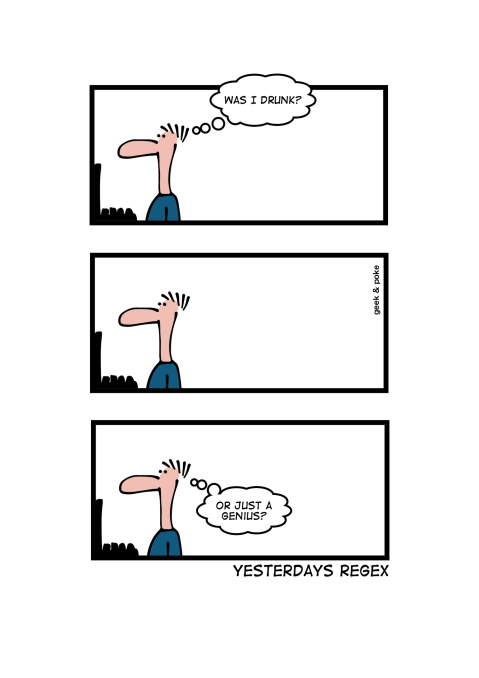10 practical but paranoid Java programming techniques
After immersing yourself in coding for a period of time, you will gradually become accustomed to these things. Because, you know...
Anything can go wrong, yes, it does.
This is why we adopt "defensive programming", which is the reason for some paranoid habits. Below are what I personally consider to be the 10 most useful but paranoid Java programming techniques. Let’s take a look:

1. Put the String string at the front
In order to prevent occasional NullPointerException exceptions, we usually place String on the left side of the equals() function to implement string comparison. The following code:
// Bad
if (variable.equals("literal")) { ... }
// Good
if ("literal".equals(variable)) { ... }This is something you can do just by thinking about it. From the Bad version of the code to rewriting the expression to the Good version of the code, nothing will be lost in the process. Different opinions are welcome...
2. Don’t trust the early JDK API
In the early days of Java, programming was a very painful thing. Those APIs are still very immature, and maybe you've encountered the following code block:
String[] files = file.list();
// Watch out
if (files != null) {
for (int i = 0; i < files.length; i++) {
...
}
}Looking paranoid? Maybe, but see the Javadoc:
If this virtual path does not represent a folder directory, this method returns null. Otherwise, an array of strings will be returned, each string representing a file or folder in the directory.
Yes, that’s right. We can add some verification:
if (file.isDirectory()) {
String[] files = file.list();
// Watch out
if (files != null) {
for (int i = 0; i < files.length; i++) {
...
}
}
}3. Don’t believe “-1”
I know this is paranoid, but the Javadoc clearly points out the String.indexOf() method: the position of the first occurrence of the specified character in the object Index, if it is -1, it means that the character is not in the character sequence.
So using -1 is a no-brainer, right? I'm not sure, please look at the following code:
// Bad
if (string.indexOf(character) != -1) { ... }
// Good
if (string.indexOf(character) >= 0) { ... }Who knows. Maybe by then they've changed the encoding so that strings are not case-sensitive, and maybe a better way is to return -2? Who knows.
4. Avoid accidental assignment
Yes. This may happen often.
// Ooops
if (variable = 5) { ... }
// Better (because causes an error)
if (5 = variable) { ... }
// Intent (remember. Paranoid JavaScript: ===)
if (5 === variable) { ... }So you can place the comparison constant on the left side, so that accidental assignment errors will not occur.
5. Check Null and Length
No matter what, as long as you have a collection, array, etc., make sure it exists and is not empty.
// Bad
if (array.length > 0) { ... }
// Good
if (array != null && array.length > 0) { ... }You don’t know where these arrays come from, maybe from an earlier version of the JDK API, who knows.
6. All methods are final
You may tell me your open/closed principle, but this is all nonsense. I don't believe you (correctly inherit all subclasses of my parent class), and I don't believe myself (accidentally inherit all subclasses of my parent class). Therefore, methods with clear meaning should be strictly marked with final.
// Bad
public void boom() { ... }
// Good. Don't touch.
public final void dontTouch() { ... }7. All variables and parameters are final
Like I said. I don't trust myself (not to accidentally overwrite my values). Having said that, I don’t believe mine because…

…这就是为什么所有的变量和参数都是final的原因。
// Bad
void input(String importantMessage) {
String answer = "...";
answer = importantMessage = "LOL accident";
}
// Good
final void input(final String importantMessage) {
final String answer = "...";
}8.重载时不要相信泛型
是,它可以发生。你相信你写的超级好看的API,它很直观,随之而来的,一些用户谁只是将原始类型转换成Object类型,直到那该死的编译器停止发牢骚,并且突然他们会链接错误的方法,以为这是你的错误。
看下面的代码:
// Bad
<T> void bad(T value) {
bad(Collections.singletonList(value));
}
<T> void bad(List<T> values) {
...
}
// Good
final <T> void good(final T value) {
if (value instanceof List)
good((List<?>) value);
else
good(Collections.singletonList(value));
}
final <T> void good(final List<T> values) {
...
}因为,你知道……你的用户,他们就像
// This library sucks
@SuppressWarnings("all")
Object t = (Object) (List) Arrays.asList("abc");
bad(t);相信我。这一切我都看到过。包括下面的

这种偏执还是不错的。
9.总是在Switch语句的Default中抛出异常
Switch语句……它们其中一个可笑的语句我不知道该对它敬畏还是哭泣,但无论如何,既然我们坚持用switch,那我们不妨将它用得完美,看下面的代码:
// Bad
switch (value) {
case 1: foo(); break;
case 2: bar(); break;
}
// Good
switch (value) {
case 1: foo(); break;
case 2: bar(); break;
default:
throw new ThreadDeath("That'll teach them");
}当value == 3时,将会出现无法找到的提示,而不会让人不知所谓。
10.Switch语句带花括号
事实上,switch是最邪恶的语句,像是一些喝醉了或者赌输了的人在写代码一样,看下面的例子:
// Bad, doesn't compile
switch (value) {
case 1: int j = 1; break;
case 2: int j = 2; break;
}
// Good
switch (value) {
case 1: {
final int j = 1;
break;
}
case 2: {
final int j = 2;
break;
}
// Remember:
default:
throw new ThreadDeath("That'll teach them");
}在switch语句中,每一个case语句的范围只有一行语句,事实上,这些case语句甚至不是真正的语句,他们就像goto语句中的跳转标记一样。
在switch语句中,每一个case语句的范围只有一行语句,事实上,这些case语句甚至不是真正的语句,他们就像goto语句中的跳转标记一样。
结论
偏执编程看起来似乎不可思议,有时,因为代码经常被证明是更详细一点,但并不是需求需要。你可能会想,“哦,这是绝不会发生的”,但正如我所说。经过20年左右的时间编程,你不希望只修复这些愚蠢的bug,因为编程语言是如此的陈旧的和有缺陷的。因为你知道…

Hot AI Tools

Undresser.AI Undress
AI-powered app for creating realistic nude photos

AI Clothes Remover
Online AI tool for removing clothes from photos.

Undress AI Tool
Undress images for free

Clothoff.io
AI clothes remover

AI Hentai Generator
Generate AI Hentai for free.

Hot Article

Hot Tools

Notepad++7.3.1
Easy-to-use and free code editor

SublimeText3 Chinese version
Chinese version, very easy to use

Zend Studio 13.0.1
Powerful PHP integrated development environment

Dreamweaver CS6
Visual web development tools

SublimeText3 Mac version
God-level code editing software (SublimeText3)

Hot Topics
 Square Root in Java
Aug 30, 2024 pm 04:26 PM
Square Root in Java
Aug 30, 2024 pm 04:26 PM
Guide to Square Root in Java. Here we discuss how Square Root works in Java with example and its code implementation respectively.
 Perfect Number in Java
Aug 30, 2024 pm 04:28 PM
Perfect Number in Java
Aug 30, 2024 pm 04:28 PM
Guide to Perfect Number in Java. Here we discuss the Definition, How to check Perfect number in Java?, examples with code implementation.
 Random Number Generator in Java
Aug 30, 2024 pm 04:27 PM
Random Number Generator in Java
Aug 30, 2024 pm 04:27 PM
Guide to Random Number Generator in Java. Here we discuss Functions in Java with examples and two different Generators with ther examples.
 Armstrong Number in Java
Aug 30, 2024 pm 04:26 PM
Armstrong Number in Java
Aug 30, 2024 pm 04:26 PM
Guide to the Armstrong Number in Java. Here we discuss an introduction to Armstrong's number in java along with some of the code.
 Weka in Java
Aug 30, 2024 pm 04:28 PM
Weka in Java
Aug 30, 2024 pm 04:28 PM
Guide to Weka in Java. Here we discuss the Introduction, how to use weka java, the type of platform, and advantages with examples.
 Smith Number in Java
Aug 30, 2024 pm 04:28 PM
Smith Number in Java
Aug 30, 2024 pm 04:28 PM
Guide to Smith Number in Java. Here we discuss the Definition, How to check smith number in Java? example with code implementation.
 Java Spring Interview Questions
Aug 30, 2024 pm 04:29 PM
Java Spring Interview Questions
Aug 30, 2024 pm 04:29 PM
In this article, we have kept the most asked Java Spring Interview Questions with their detailed answers. So that you can crack the interview.
 Break or return from Java 8 stream forEach?
Feb 07, 2025 pm 12:09 PM
Break or return from Java 8 stream forEach?
Feb 07, 2025 pm 12:09 PM
Java 8 introduces the Stream API, providing a powerful and expressive way to process data collections. However, a common question when using Stream is: How to break or return from a forEach operation? Traditional loops allow for early interruption or return, but Stream's forEach method does not directly support this method. This article will explain the reasons and explore alternative methods for implementing premature termination in Stream processing systems. Further reading: Java Stream API improvements Understand Stream forEach The forEach method is a terminal operation that performs one operation on each element in the Stream. Its design intention is






